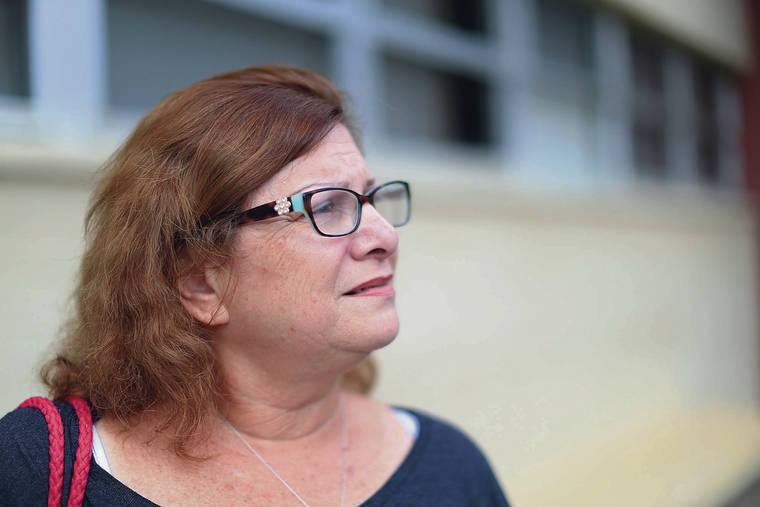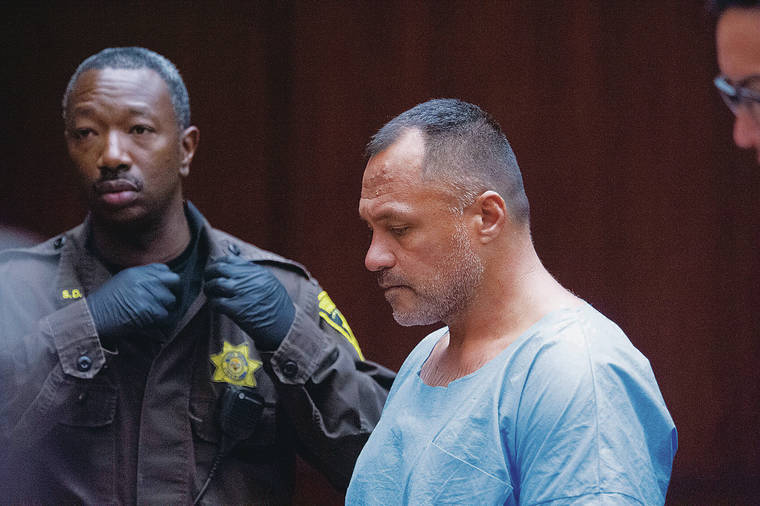Every day, Pamela Sallas visits her 45-year-old daughter at the Rehabilitation Hospital of the Pacific, where she is recovering from a brutal knife attack allegedly by her estranged boyfriend in September.
Family members fear Patience Sallas may never walk again due to spinal nerve damage from the assault.
“We hope at the end of therapy that she can walk,” her mother said. “It’s day by day.”
The attack against Sallas is one of two high-profile domestic violence cases involving intimate and former intimate partners that occurred in a single day on Oahu in September. The other case involved a newly divorced couple: a 46-year-old man killed his ex-wife before fatally shooting himself.
The cases underscore the plight of domestic violence victims statewide.
“The community is awakened and reminded that domestic violence is real and happening every day of the week, is happening in all communities,” said Nanci Kreidman, chief executive officer of the Domestic Violence Action Center.
In October, National Domestic Violence Awareness Month, Hawaii’s social service providers are bringing attention to the issue as well as services available to help victims leave abusive relationships.
In the wake of the recent stabbing and murder-suicide, Kreidman said, “It may inspire somebody to express concern to a co-worker or mention it to a family member or ask their daughter about their relationship. It does sort of have a way of penetrating your consciousness. And all the time people spend avoiding it or looking the other way or minimizing it, that gets abandoned after tragedies and deaths like this.”
A majority of domestic violence victims are women.
Domestic violence is generally underreported, but when a community experiences deadly assaults, calls to the Domestic Violence Actions Center spike from other victims who are worried their abusive partner could act on their threats.
Domestic violence is about power and control, said Karen Tan, president and chief executive officer of Child and Family Service. “Some of the underreporting is because the victim has been told, ‘If you leave me or if you tell anyone, I’ll kill you.’ And so we want to understand that that’s a real threat and it is why a lot of victims don’t come forward.”
Robert Boyack, program administrator of Child and Family Service, said often victims do not report abuse because of the shame associated with it. “Just being a victim and the shame of family members as well” is enough to foster silence, he said. “The need to keep the family unit together is a driving force for not reporting violence and not seeking help.”
Experts say “victim blaming” is prevalent in society, which can have a silencing effect for women who already may be enduring disparaging comments such as “if you stay, you deserve this” or “he’s a good provider,” or “maybe if you just came home on time or took better care of the kids” things would be better, Kreidman said.
“Victims know generally how the community feels about victims. and nobody wants to be judged like that. Nobody wants to be shamed like that,” she added. “It’s sort of irresponsible for the community to be just saying, ‘Well, why doesn’t she just leave’ without making a more intentional effort at understanding what is in the way of her leaving and maybe we can address some of that.”
It could take multiple attempts before a victim ultimately makes the decision to sever ties with an abuser.
Ending the relationship
Experts say support for the victim, especially when he or she makes the decision to leave, is crucial because that is the most dangerous time.
“Safety becomes paramount as soon as they leave,” said Angelina Mercado, executive director of the Hawaii State Coalition Against Domestic Violence.
Tan said, “The risk is escalated because he or she, whoever the controller is, is really losing the control and losing their relationship potentially.”
In addition to the physical violence and threats, the batterer might have financial control. Mercado noted Hawaii’s housing crisis is an obstacle when a victim is trying to end such relationships.
“We all know that affordable housing is too hard to come by. That has a huge impact on just trying to get out of the door.”
If necessary, social service providers are available to assist a victim with filing a temporary restraining order against their batterer and accompany them to court for hearings.
Nearly 5,200 domestic protective orders were filed at courts statewide in fiscal year 2018-2019 based on statistics from the Hawaii State Judiciary, a slight drop from the previous year. The statistics, however, comprise all filings by victims of intimate partner violence as well as other victims alleging abuse by a family or household members such as father-son, mother-daughter or sister-brother.
Boyack said a victim may file a temporary restraining order but it’s not the ultimate safety measure.
Providers statewide offer a variety of assistance to help survivors, They include development of a safety plan, shelter, job referrals, legal representation and counseling.
In some cases, if a victim on a neighbor island is in grave danger, providers such as Child and Family Service would fly them to Oahu and admit them into one of their shelters.
There may be victims who believe the batterer will eventually change and stop his or her abusive behavior, but experts warn the situation usually deteriorates.
“Don’t think the behaviors you see while you’re dating are going to get any better. In fact, it’s going to get worse,” Tan said.
Mercado said an abuser can be deceptive by charming a partner into thinking they may be able to work things out.
Patience Sallas and her estranged boyfriend and father of their two daughters, Michael P. Gibbs, had been in a volatile relationship for more than 20 years. Sallas’ mother said her daughter had attempted to leave him but was immobilized by fear. “She didn’t know how to get out.”
“We tried to protect her,” she added.
Gibbs, 46, remains in custody at the Oahu Community Correctional Center in lieu of $1 million bail on attempted murder charges in connection with the Sept. 19 stabbing in Mililani, where he was also accused of attacking their 17-year-old daughter after she tried to pull him off her mother. Their daughter received nearly 100 stitches to her face for deep lacerations.
Gibbs, who has a lengthy criminal record, was convicted of assault in a 2005 attack against Sallas in which she suffered a concussion, broken nose and broken eye socket.
Court records show Patience Sallas filed three temporary restraining orders against Gibbs. Sallas’ mother criticized the judicial system, saying it failed to protect her daughter. “How can the judges give him chance after chance?” she asked.
Gibbs’ attorney, Harrison Kiehm, could not be reached for comment.
Daniel Galanis, an epidemiologist with the state Department of Health’s Emergency Medical Services & Injury Prevention Systems Branch, estimates 330 women who sustain domestic violence-related injuries are taken to a hospital by EMS each year, based on recent data. An estimated 610 women are treated by EMS but do not seek further medical attention at a hospital each year.
“Part of that decision is fear of consequences of making the abuse known to people outside of the household … the fear that there is going to be retaliation from the abuser,” Galanis said.
On the same day of the stabbing, Marcos Villaspir killed his ex-wife, Imelda Villaspir, 49, before he fatally shot himself. Court records show the two divorced in August after a nearly 25-year marriage.
The shooting occurred at a home where Imelda Villaspir resided with their adult son and daughter and set up a care home.
At least 37 murder-suicides in Hawaii involving intimate partners occurred from 1991 through 2018. All but one of the 37 perpetrators in the cases were men, according to Galanis.
Community support
Providers say education is key to eliminate victim blaming and misconceptions and myths to reach a practical approach to address the problem of domestic violence. Without a deeper understanding, “we’ll never achieve that,” Kreidman said.
Friends, co-workers and family members can offer support. “If you know somebody who you suspect is experiencing abuse or you see red flags, set aside your judgment. Become a listening ear, be patient, offer support,” she added. “Nobody deserves to be treated this way.”
“If we’re not looking out for one another, we’re condoning the perpetuation of domestic violence,” Kreidman said.
—
BY THE NUMBERS
Estimated number of women treated by Emergency Medical Services in Hawaii each year with injuries involving intimate partner violence:
>> 330 women treated by EMS and taken to hospitals for further medical attention
>> 610 women treated by EMS but do not seek further medical attention at hospitals.
—
VIOLENCE AT HOME
Murder-suicides involving intimate partner violence in Hawaii from 1991 to 2018 totaled 37. Here is a breakdown by county:
>> Honolulu: 21
>> Maui: 9
>> Hawaii: 4
>> Kauai: 3
All but one of the 37 perpetrators in the murder-suicide cases were men. The perpetrators and victims were residents of Hawaii.
Source: Hawaii State Department of Health Emergency Medical Services & Injury Prevention System Branch
—
SUPPORT FOR FAMILY
The Domestic Violence Action Center offers tips on how family and friends can help someone in an abusive relationship:
>> Offer support. Let the individual know you are there to help and talk to.
>> Listen. Be nonjudgmental.
>> Be understanding.
>> Provide information on community resources, shelters, support groups and attorneys.
—
HELP IS OUT THERE
Here’s a list of resources in Hawaii to help victims of domestic violence:
Oahu
>> Catholic Charities of Hawaii – Counseling offered. Phone: 524-4673. Hotline: 521-4357
>> Child & Family Service – Emergency shelter, advocacy, counseling and domestic violence intervention offered. Phone: 681-3500. Hotline: 841-0822
>> Domestic Violence Action Center – Legal, advocacy, teen advocacy and assistance with filing a temporary restraining order offered. Phone: 534-0040. Hotline: 531-3771
>> Legal Aid Society of Hawaii – Legal and immigration services offered. Phone: 536-4302
>> Parents and Children Together – Emergency shelter, transitional housing, advocacy, counseling, domestic violence intervention offered: Phone: 847-3285. Hotline: 266-SAFE (7233) Note: Child & Family Service also field calls to this hotline number.
Maui County
>> Child & Family Service – Phone: 808-877-6888
>> Legal Aid Society of Hawaii – Phone: 1-800-499-4302 for Maui, Lanai and Molokai
>> Molokai Community Service Council – Emergency shelter, assistance with filing a temporary restraining order, advocacy, domestic violence intervention offered. Phone: 808-553-3244. Hotline: 808-567-6888
>> Maui Parents and Children Together – Phone: 808-243-7001
>> Women Helping Women – Emergency shelter, advocacy and assistance with filing a temporary restraining order offered: Phone: 808-242-6600. Maui hotline: 808-579-9581. Lanai hotline: 808-563-0216
Hawaii County
>> Child & Family Service – East Hawaii Phone: 808-959-6118. Hotline: 808-959-8864. West Hawaii Phone: 808-323-2664. Hotline: 808-322-7233
>> Legal Aid Society of Hawaii – Phone: 1-800-499-4302, East and West Hawaii
>> Lokahi Treatment Centers – Counseling and domestic violence intervention offered: Phone: 808-969-9292 East Hawaii. Phone: 808-331-1175 West Hawaii
>> Neighborhood Place of Kona – Family support services: Phone: 331-8777
Kauai County
>> Legal Aid Society of Hawaii – Phone: 1-800-499-4302
>> YWCA – Emergency shelter, advocacy, domestic violence intervention services offered: Phone: 808-245-8404. Hotline: 808-245-6362
For additional information on providers in Hawaii, call the Hawaii State Coalition Against Domestic Violence at 832-9316 or visit hscadv.org Opens in a new tab. The National Domestic Violence Hotline is available 24 hours, 7 days a week at 1-800-799-7233








